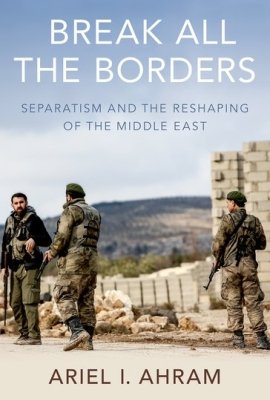Book Launch: Break all the Borders: Separatism and the Reshaping of the Middle East
The civil wars wracking the Arab world underscore the continued misalignment between national identity and political borders in much of the region. In his new book Break all the Borders: Separatism and the Reshaping of the Middle East (Oxford, 2019), former Wilson Fellow Ariel I. Ahram examines the separatist movements that aimed to remake those borders and create new independent states. With detailed studies of the Islamic State in Iraq and Syria, the federalists in eastern Libya, the southern resistance in Yemen, and Kurdish nationalist parties, Ahram explains how separatists captured territory and governed populations. Ahram shows how separatists drew inspiration from the legacy of Woodrow Wilson and ideals of self-determination. They sought to reinstate political autonomy that had been lost during the early and mid-twentieth century. Separatists promised a more just and stable world order and often served as the international community’s allies against radical Islamic groups. Yet their hopes for international recognition have gone unfulfilled. Separatists are now poised as spoilers as the international community struggles to resolve conflicts in Libya, Yemen, Syria, and Iraq. Integrating, instead of eliminating, separatist movements is critical for rebuilding regional order.
Selected Quotes
Ariel I. Ahram
“When I started working on this book, I thought that I was really going to talk about ISIS. I thought that ISIS was the most interesting example of ‘border breaking.’ But the more that I looked at the Islamic State, the more that I realized that even though they were different and new in so many ways, they were also an old idea. The idea of changing borders in the region was not something that the Islamic State invented. In fact, there were a number of actors who came to the fore in 2011/2012 who talked about adjusting borders in different ways.”
“While Westerners tend to think of the region – the states of the region - as being too big, pulling together too many groups, most actors within the region, for the most part, have imagined the states as being too small. Right, the Islamic State’s argument was not that they didn’t want to be part of a state, but they said that ‘the state that we have is too small, the borders we have subdivide us too much.’”
“It is interesting to think about how this overlay of the old map and the new map shows up, which kind of palimpsests old political structures that reappear when states seem to be faltering”
“... The separatists are in a position to make the argument that the international community needs to engage these areas more intensively. And they can do that in a number of different ways...."
“Separatists seize the opportunity of state breakdown. They’re rarely strong enough alone. They have to wait for windows of opportunity. These opportunities come, often times, because of the availability of oil, or other natural resources. They make deals with international patrons. The separatists are also probably the last actors in the region to seriously consider self-determination as an important idea. This is an interesting thing to say at the Wilson Center, but the separatists are the last Wilsonians, certainly in the Middle East.”
“The separatists are especially notable because they push this idea that there is a separation. What they want to separate is their regional identity and the national identity, whereas a lot of groups say ‘our national identity, and our regional identity, and our sectarian identity go hand in hand, there’s no conflict. It’s easy to be both.’ Separatists are sort of forcing the question.”
David Ottaway
“[Somalia is] beginning to gain some kind of regional recognition – if not international recognition. Lebanon, we all know, is a state that’s segmented by religious groups. And the region, and the whole international community, have lived with these two types of segmented, nonfunctioning, de jure states.”
“We have two examples of successful breakaways, one in Eritrea from Ethiopia [and] the South Sudan from the North Sudan. These were negotiated [and] agreed-upon separations in both cases… My question is: is it possible we’re going to begin to see other negotiated separations between the center and the periphery in any of these movements you’ve looked at?”
“The Arabs have to rethink the Arab state and how it’s functioning. And they have to rethink federalism.”
For book purchases, click here.
Related Publication

Break all the Borders: Separatism and the Reshaping of the Middle East
Speakers

Associate Professor, Virginia Tech School of Public and International Affairs

Former Washington Post Middle East Correspondent
Moderator

Hosted By

Middle East Program
The Wilson Center’s Middle East Program serves as a crucial resource for the policymaking community and beyond, providing analyses and research that helps inform US foreign policymaking, stimulates public debate, and expands knowledge about issues in the wider Middle East and North Africa (MENA) region. Read more
